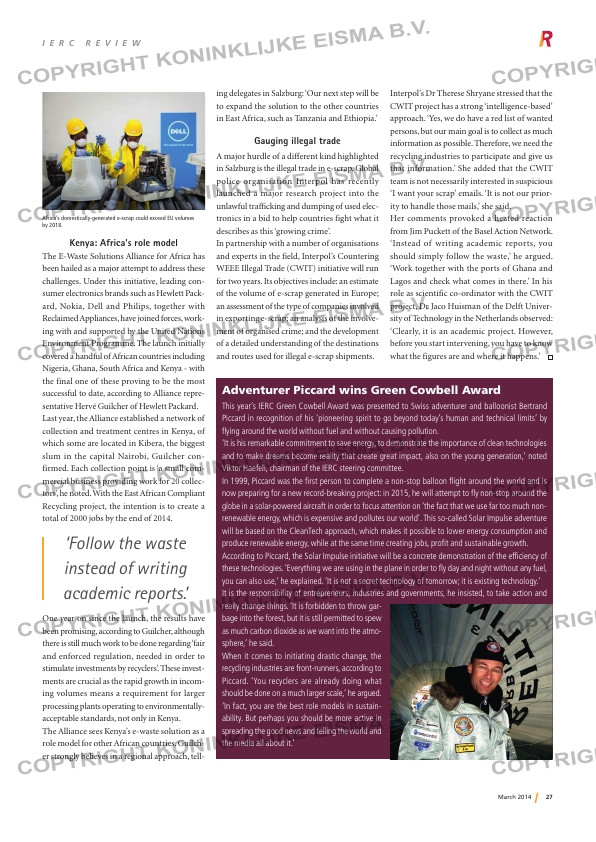Page 27 from: March 2014

27March 2014
I E R C R E V I E W
Adventurer Piccard wins Green Cowbell Award
This year’s IERC Green Cowbell Award was presented to Swiss adventurer and balloonist Bertrand
Piccard in recognition of his ‘pioneering spirit to go beyond today’s human and technical limits’ by
flying around the world without fuel and without causing pollution.
‘It is his remarkable commitment to save energy, to demonstrate the importance of clean technologies
and to make dreams become reality that create great impact, also on the young generation,’ noted
Viktor Haefeli, chairman of the IERC steering committee.
In 1999, Piccard was the first person to complete a non-stop balloon flight around the world and is
now preparing for a new record-breaking project: in 2015, he will attempt to fly non-stop around the
globe in a solar-powered aircraft in order to focus attention on ‘the fact that we use far too much non-
renewable energy, which is expensive and pollutes our world’. This so-called Solar Impulse adventure
will be based on the CleanTech approach, which makes it possible to lower energy consumption and
produce renewable energy, while at the same time creating jobs, profit and sustainable growth.
According to Piccard, the Solar Impulse initiative will be a concrete demonstration of the efficiency of
these technologies. ‘Everything we are using in the plane in order to fly day and night without any fuel,
you can also use,’ he explained. ‘It is not a secret technology of tomorrow; it is existing technology.’
It is the responsibility of entrepreneurs, industries and governments, he insisted, to take action and
really change things. ‘It is forbidden to throw gar-
bage into the forest, but it is still permitted to spew
as much carbon dioxide as we want into the atmo-
sphere,’ he said.
When it comes to initiating drastic change, the
recycling industries are front-runners, according to
Piccard. ‘You recyclers are already doing what
should be done on a much larger scale,’ he argued.
‘In fact, you are the best role models in sustain-
ability. But perhaps you should be more active in
spreading the good news and telling the world and
the media all about it.’
Kenya: Africa’s role model
The E-Waste Solutions Alliance for Africa has
been hailed as a major attempt to address these
challenges. Under this initiative, leading con-
sumer electronics brands such as Hewlett Pack-
ard, Nokia, Dell and Philips, together with
Reclaimed Appliances, have joined forces, work-
ing with and supported by the United Nations
Environment Programme. The launch initially
covered a handful of African countries including
Nigeria, Ghana, South Africa and Kenya – with
the final one of these proving to be the most
successful to date, according to Alliance repre-
sentative Hervé Guilcher of Hewlett Packard.
Last year, the Alliance established a network of
collection and treatment centres in Kenya, of
which some are located in Kibera, the biggest
slum in the capital Nairobi, Guilcher con-
firmed. Each collection point is ‘a small com-
mercial business providing work for 20 collec-
tors’, he noted. With the East African Compliant
Recycling project, the intention is to create a
total of 2000 jobs by the end of 2014.
One year on since the launch, the results have
been promising, according to Guilcher, although
there is still much work to be done regarding ‘fair
and enforced regulation, needed in order to
stimulate investments by recyclers’. These invest-
ments are crucial as the rapid growth in incom-
ing volumes means a requirement for larger
processing plants operating to environmentally-
acceptable standards, not only in Kenya.
The Alliance sees Kenya’s e-waste solution as a
role model for other African countries. Guilch-
er strongly believes in a regional approach, tell-
ing delegates in Salzburg: ‘Our next step will be
to expand the solution to the other countries
in East Africa, such as Tanzania and Ethiopia.’
Gauging illegal trade
A major hurdle of a different kind highlighted
in Salzburg is the illegal trade in e-scrap. Global
police organisation Interpol has recently
launched a major research project into the
unlawful trafficking and dumping of used elec-
tronics in a bid to help countries fight what it
describes as this ‘growing crime’.
In partnership with a number of organisations
and experts in the field, Interpol’s Countering
WEEE Illegal Trade (CWIT) initiative will run
for two years. Its objectives include: an estimate
of the volume of e-scrap generated in Europe;
an assessment of the type of companies involved
in exporting e-scrap; an analysis of the involve-
ment of organised crime; and the development
of a detailed understanding of the destinations
and routes used for illegal e-scrap shipments.
Interpol’s Dr Therese Shryane stressed that the
CWIT project has a strong ‘intelligence-based’
approach. ‘Yes, we do have a red list of wanted
persons, but our main goal is to collect as much
information as possible. Therefore, we need the
recycling industries to participate and give us
that information.’ She added that the CWIT
team is not necessarily interested in suspicious
‘I want your scrap’ emails. ‘It is not our prior-
ity to handle those mails,’ she said.
Her comments provoked a heated reaction
from Jim Puckett of the Basel Action Network.
‘Instead of writing academic reports, you
should simply follow the waste,’ he argued.
‘Work together with the ports of Ghana and
Lagos and check what comes in there.’ In his
role as scientific co-ordinator with the CWIT
project, Dr Jaco Huisman of the Delft Univer-
sity of Technology in the Netherlands observed:
‘Clearly, it is an academic project. However,
before you start intervening, you have to know
what the figures are and where it happens.’
‘Follow the waste
instead of writing
academic reports.’
Africa’s domestically-generated e-scrap could exceed EU volumes
by 2018.
RI-2-2014-IERC.indd 27 06-03-14 08:43



